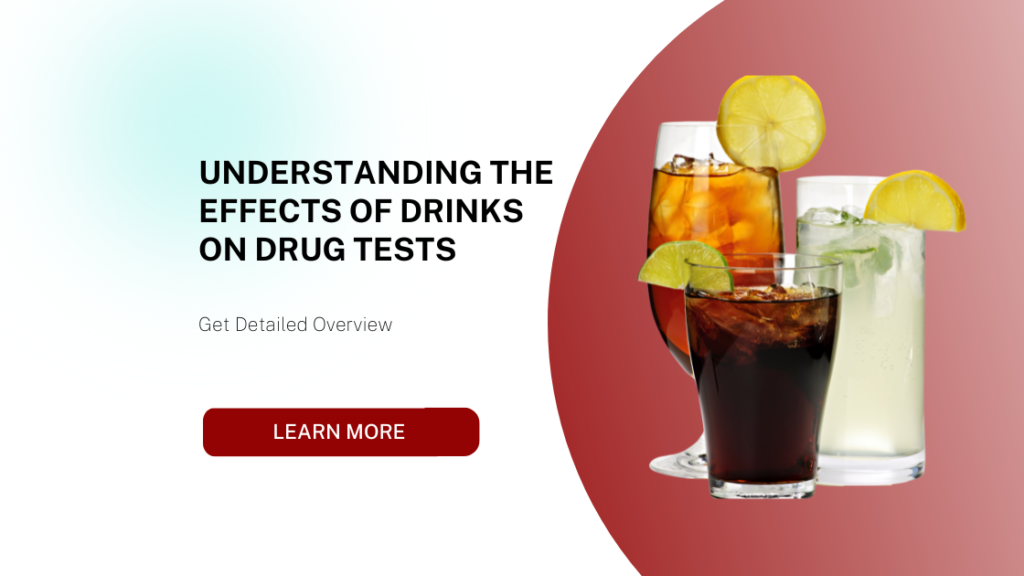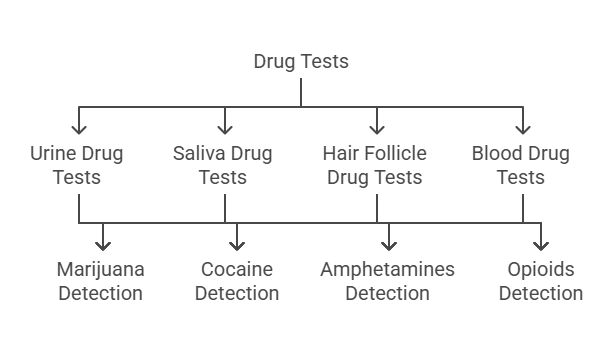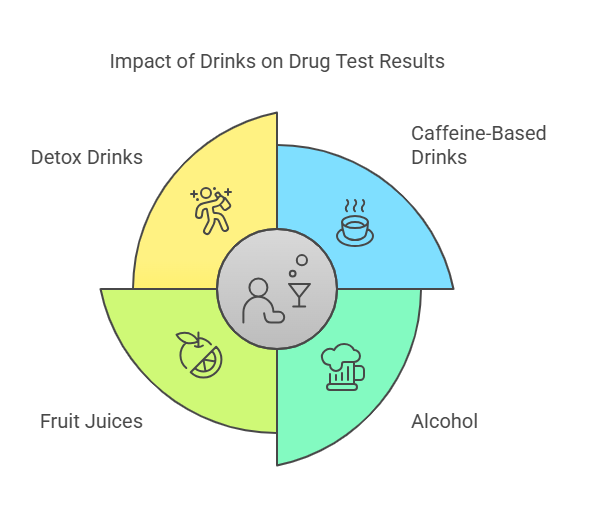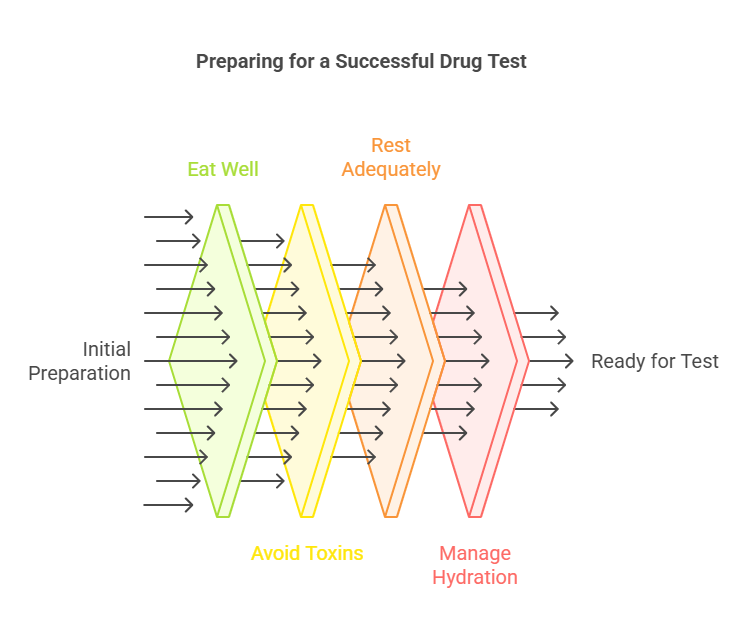Understanding the Effects of Drinks on Drug Screening

What Not to Drink Before Drug Screening: A Guide to Avoiding Common Mistakes
Drug screening is a vital process in many industries, especially in workplaces that require a drug-free environment. Whether it’s for employment purposes, legal situations, or medical reasons, understanding the best practices for preparing for a drug test is crucial. One of the most overlooked aspects of drug testing preparation is hydration and the drinks consumed before the test. Certain beverages can alter your test results or even lead to inconclusive or failed results.
In this comprehensive guide, we’ll explore what not to drink before a drug screening, including the effects of caffeine, alcohol, fruit juices, and detox drinks. We’ll also provide best practices for preparing for drug tests and the role of reliable services like ExactBackgroundChecks.com in ensuring smooth and accurate testing.
What is Drug Screening?
Drug screening refers to the process of testing an individual’s biological sample (such as urine, saliva, hair, or blood) to detect the presence of illicit substances or controlled substances. Employers, law enforcement agencies, and healthcare providers often use drug tests to determine whether someone is under the influence of drugs or has a history of drug use.
Common Types of Drug Tests

Drug screenings can be conducted in several ways. The most common methods include:
- Urine Drug Tests: The most widely used method, especially in workplace drug testing. This test is used to detect a variety of drugs, including marijuana, cocaine, amphetamines, and opioids.
- Saliva Drug Tests: These are generally used for detecting recent drug use, particularly within a few hours or days.
- Hair Follicle Drug Tests: This method can detect drug use over a longer period (up to 90 days) by analyzing hair samples.
- Blood Drug Tests: Blood tests are the most invasive and accurate, often used in legal or emergency medical situations.
The substances detected by these tests include marijuana, cocaine, opioids, amphetamines, and even alcohol, depending on the test type and the substances being tested for.
The Role of Hydration in Drug Testing
Hydration is a key factor when it comes to drug testing, but how much you drink matters. Being adequately hydrated ensures that your body is functioning optimally and that your urine sample is neither too diluted nor too concentrated.
However, over-hydrating can lead to a false result. Excessive water consumption can dilute your urine, making it difficult to detect drugs. This could lead to a negative or inconclusive result, or even trigger a retest. On the other hand, insufficient hydration can make it difficult to provide a sample or result in inaccurate readings.
What to Avoid Drinking Before a Drug Test

When preparing for a drug test, it’s essential to be mindful of what you drink. Certain drinks can affect the test results and, in some cases, alter your body’s ability to pass the test. Here are the drinks you should avoid before a drug test:
1. Caffeine-Based Drinks (Coffee, Tea, Energy Drinks)
Caffeine, found in coffee, tea, and energy drinks, acts as a diuretic, which can increase urination and affect hydration levels. Drinking caffeinated beverages before a drug test can lead to dehydration, which may interfere with the accuracy of your test. Additionally, excessive caffeine intake can increase anxiety and may lead to a faster metabolism of drugs in some individuals, making it difficult to detect certain substances.
2. Alcohol
Alcohol can severely impact both hydration and liver function, which is crucial for detoxification. Drinking alcohol before a drug test can lead to dehydration, making it harder to pass a urine test. Moreover, alcohol can influence the metabolism of drugs in your system, potentially interfering with your test results. It’s best to avoid alcohol 24-48 hours before your test to ensure that your body is functioning normally.
3. Fruit Juices (Especially High-Sugar Varieties)
While fruit juices may seem healthy, they can have a significant impact on your drug test, especially those with high sugar content. Sugary beverages can alter the pH levels in your urine, which may affect the results of a urine test. Additionally, some fruit juices, such as cranberry juice, are mistakenly believed to help flush out toxins from the body. However, they don’t have any significant impact on drug detoxification and could potentially interfere with accurate drug detection.
4. Detox Drinks
Detox drinks, often marketed as a way to help individuals pass drug tests, should be avoided at all costs. While these drinks may temporarily mask the presence of drugs, they don’t remove drugs from the system. In many cases, detox drinks can alter the chemical composition of your urine, leading to inaccurate or inconclusive results. These products are also generally unregulated, meaning they could contain harmful chemicals that could interfere with your health or the accuracy of the test.
Best Practices Before a Drug Test

To ensure a successful drug screening, it’s important to take the right steps in preparation. Here are some best practices:
1. Eat Well and Hydrate Properly
A balanced meal and proper hydration are essential before a drug test. While you should avoid excessive water intake right before the test, it’s important to drink moderate amounts of water throughout the day to maintain optimal hydration levels. Eating nutritious foods also supports your metabolism and helps your body process substances more efficiently.
2. Avoid Toxic Substances
Avoid consuming any substances that could interfere with the test. This includes alcohol, nicotine, and illicit drugs. Even prescribed medications should be discussed with your testing provider to ensure they won’t impact your results.
3. Get Plenty of Rest
Proper rest and sleep before the test can help your body metabolize remaining substances more effectively. Lack of sleep can increase the stress hormones in your body, which may impact how your body processes and eliminates substances.
When to Stop Drinking
If you are taking a urine drug test, it’s recommended to stop drinking fluids about 1-2 hours before the test. This allows your urine to be sufficiently concentrated, reducing the chances of dilution. The optimal hydration level for urine is typically indicated by a light yellow color, so be mindful of your hydration status leading up to the test.
How ExactBackgroundChecks.com Supports the Drug Screening Process
ExactBackgroundChecks.com offers reliable and professional drug screening services for both employers and individuals. They help businesses manage their employee screening programs, ensuring that drug testing protocols are followed correctly and results are accurate. The platform uses advanced technology and comprehensive testing methods to minimize errors, ensuring that drug tests are conducted properly and efficiently.
By partnering with ExactBackgroundChecks.com, businesses can ensure compliance with regulatory requirements and provide a safe working environment free of substance abuse. The platform also offers seamless integration with background checks, making it easier for companies to perform drug tests in conjunction with employment screening.
Legal Aspects of Drug Screening
Drug screening, particularly in the workplace, is governed by a variety of laws and regulations that employers must follow. These laws vary by region and can depend on factors like the type of industry, the nature of the job, and state or federal laws.
Workplace Policies
Employers often require drug testing as part of the hiring process, for ongoing employee monitoring, or following workplace accidents. Pre-employment drug testing is standard practice in many industries, especially those involving safety-sensitive positions. Employers need to ensure that their testing policies comply with local, state, and federal laws, including anti-discrimination laws.
Privacy and Consent
Drug testing must be done with the individual’s consent, and the process must adhere to privacy regulations, such as the Health Insurance Portability and Accountability Act (HIPAA) in the United States. Employers cannot disclose test results without permission, and they must handle the results with strict confidentiality.
Handling Failed Drug Tests
When an employee fails a drug test, employers may have to follow specific legal procedures. These can include offering a second test, providing the opportunity for the employee to explain the results, or following company-specific disciplinary actions. The consequences can range from suspension to termination, depending on the employer’s policies and the laws in place.
Drug Testing in Different States
Some states have legalized marijuana use, which complicates drug testing in the workplace. In states where marijuana is legal, employers must still adhere to federal guidelines that classify marijuana as an illegal drug. Employees may face termination if they fail a drug test for marijuana use, even in states where marijuana is legal for recreational or medicinal use.
Frequently Asked Questions (FAQs)
What types of drinks should I avoid before a drug screening?
Avoid caffeine-based drinks (coffee, tea, energy drinks), alcohol, high-sugar fruit juices, and detox drinks, as they can affect hydration levels and potentially alter test results.
How does hydration affect drug testing?
Proper hydration is essential for accurate results. Over-hydration can dilute urine, leading to false negatives or inconclusive results, while dehydration can make it difficult to provide a sample or result in inaccurate readings.
Why should I avoid detox drinks before a drug test?
Detox drinks often mask drug presence rather than removing drugs from the system, and they can alter urine composition, leading to inaccurate or inconclusive results. They are also unregulated and may contain harmful chemicals.
What are some best practices for preparing for a drug test?
Eat well, hydrate properly (avoiding excessive water intake right before the test), avoid toxic substances, and get plenty of rest.
What are the legal considerations regarding drug screening, especially in the workplace?
Employers must comply with local, state, and federal laws, including anti-discrimination laws. They need to obtain consent, adhere to privacy regulations like HIPAA, and follow specific procedures when handling failed drug tests, which can vary by state, especially concerning marijuana use.
What types of drinks should I avoid before a drug screening?
Avoid caffeine-based drinks (coffee, tea, energy drinks), alcohol, high-sugar fruit juices, and detox drinks, as they can affect hydration levels and potentially alter test results.
How does hydration affect drug testing?
Proper hydration is essential for accurate results. Over-hydration can dilute urine, leading to false negatives or inconclusive results, while dehydration can make it difficult to provide a sample or result in inaccurate readings.
Why should I avoid detox drinks before a drug test?
Detox drinks often mask drug presence rather than removing drugs from the system, and they can alter urine composition, leading to inaccurate or inconclusive results. They are also unregulated and may contain harmful chemicals.
What are some best practices for preparing for a drug test?
Eat well, hydrate properly (avoiding excessive water intake right before the test), avoid toxic substances, and get plenty of rest.
What are the legal considerations regarding drug screening, especially in the workplace?
Employers must comply with local, state, and federal laws, including anti-discrimination laws. They need to obtain consent, adhere to privacy regulations like HIPAA, and follow specific procedures when handling failed drug tests, which can vary by state, especially concerning marijuana use.
Conclusion
Proper preparation is key when it comes to passing a drug screening. Avoiding certain drinks, maintaining proper hydration, and following best practices for rest and nutrition can help ensure that your test results are accurate. By working with reliable services like ExactBackgroundChecks.com, both employers and employees can streamline the testing process and ensure compliance with industry standards and regulations.
By understanding what not to drink before a drug test and adhering to these tips, you can improve your chances of passing your test and avoid common mistakes that could affect the results.



